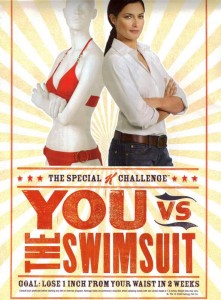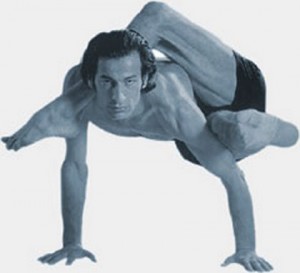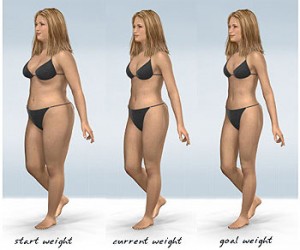June 15th, 2012 by Dr. Val Jones in News, Opinion
No Comments »
 Kellogg’s Special K cereal brand has long been known for its iconic slim woman in a red bathing suit. In a bold, Dove-soap-like new ad campaign, they have decided to feature “real women” – which apparently means women with larger BMIs – in red bathing suits. A Special K spokeswoman explains,
Kellogg’s Special K cereal brand has long been known for its iconic slim woman in a red bathing suit. In a bold, Dove-soap-like new ad campaign, they have decided to feature “real women” – which apparently means women with larger BMIs – in red bathing suits. A Special K spokeswoman explains,
“We want to encourage a responsible attitude when it comes to body image and to show that losing weight isn’t just about the way you look or a certain size you need to conform to, but more importantly about the way it makes you feel.
The fact that we are using real women for the first time of a variety of shapes and sizes is the perfect way to encourage women to think differently about losing weight and not just focus on the numbers on the bathroom scales.”
While I certainly appreciate the intent, I think there may be an even better way of achieving the objective of avoiding an over-emphasis on the bathroom scale. Instead of normalizing and accepting overweight bodies, why not show what women of the same percent body fat look like? That might be a healthier way to help us wrap our minds around the fact that (for example) 21% body fat on one woman might look very different than 21% body fat on another… Of course body fat alone is not a perfect measure of health – cardiovascular fitness doesn’t always correlate with it. But it’s a potential new way of normalizing healthy bodies rather than accepting a new overweight standard.
In fact, with the upcoming summer Olympic games, it might be fun to show the many faces of fitness. Women athletes at the peak of their performance look very different from one another. How about putting them all in red bathing suits?
Anyway, I thank Special K for opening the discussion – and I encourage us all to strive for optimal health. But as a physician, I believe that we shouldn’t accept overweight bodies as a new health standard. Good health does come in many shapes and sizes, but not in high levels of body fat.
June 13th, 2012 by Dr. Val Jones in Health Tips, Opinion, Research
1 Comment »
 If you’re like me, you probably feel guilty about not making stretching a part of your regular exercise routine. I attributed my history of low back pain to lack of stretching, although when I began practicing yoga last year I experienced no lasting benefits. Stretching was uncomfortable and I saw very little improvement in my flexibility for all my efforts. I eventually gave up after one well-meaning yogi told me that I may just be “genetically incapable” of making much progress. I turned to strength training and running with complete resolution of my back pain – though with a continued inability to bend over and touch my toes or sit cross legged for prolonged periods. Oh well. No traditional Japanese dining for me!
If you’re like me, you probably feel guilty about not making stretching a part of your regular exercise routine. I attributed my history of low back pain to lack of stretching, although when I began practicing yoga last year I experienced no lasting benefits. Stretching was uncomfortable and I saw very little improvement in my flexibility for all my efforts. I eventually gave up after one well-meaning yogi told me that I may just be “genetically incapable” of making much progress. I turned to strength training and running with complete resolution of my back pain – though with a continued inability to bend over and touch my toes or sit cross legged for prolonged periods. Oh well. No traditional Japanese dining for me!
And so it was with great surprise that I read the conclusions from a recent analysis (by Alex Hutchinson, Ph.D.) of the science of stretching. I recommend that you read it for yourself (along with the links to the primary source literature). But I’m going to summarize his findings here:
Q: Does stretching reduce the risk of injuries during exercise?
A: Not that we can prove.
Q: Does stretching help you avoid soreness after exercise?
A: No.
Q: Does stretching make you stronger or faster?
A: No. In fact, there is some evidence that stretching can have the opposite effect. Why? Muscles have spring-like properties, so that when they are stretched out, they become less able to transmit as much force. Imagine the difference between the power of a thick, metal spring and a thin metal spring. Studies have shown that the more flexible you are, the less efficient you are as a runner.
My take away message is that there’s no need to flagellate yourself into stretching if you don’t like it. It really depends on what you need to do with your body – if you’re a gymnast, then stretching will always be a part of your life. If you’re a runner who hates yoga, so be it. You may never win a toe-touching competition, but then again, you can probably crush the Primal Games competition. Wish me luck as I attempt to do just that in two weeks!
December 9th, 2011 by HarvardHealth in Health Tips, Research
No Comments »

These days, most adults are overweight, not active, or both. If you could change just one—become active or lose weight—which would be better?
At least for men, being more fit may have a bigger health payoff than losing weight, according to a new study of more than 14,000 well-off middle-aged men who are participating in the Aerobics Center Longitudinal Study. Researchers followed their health, weight, and exercise habits for 11 years. They estimated how physically fit the men were by calculating their metabolic equivalents (METs) from a treadmill test.
Compared with men whose fitness declined over the course of the study, those who maintained their fitness levels reduced their odds of dying from cardiovascular disease or any other cause by about 30%, even if they didn’t lose any excess weight. Those who improved their fitness levels saw a 40% reduction.
Body-mass index (BMI), a measurement that takes weight and height into account, was not associated with mortality. The results were published in the journal Circulation.
What is “fitness”
Fitness is a measure of Read more »
*This blog post was originally published at Harvard Health Blog*
November 13th, 2011 by John Mandrola, M.D. in Opinion, Research
No Comments »

There was a very controversial presentation made at a recent meeting of heart doctors in Canada. I’ve been stewing about what to say about it for a week.
The title speaks to its inflammation:
Fat, unfit, unmotivated: Cardiologist, heal thyself
The presenter that made the stir, pediatric cardiologist, and IronPerson, Dr. Brian McCrindle (Toronto) argued that overweight, unfit doctors are doing their patients a disservice. His bottom line: cardiologists are acting like the rest of Western society. They are not living a healthy lifestyle.
He made three major points. (in-depth coverage can be viewed here, on TheHeart.org)
*This blog post was originally published at Dr John M*
October 21st, 2011 by Dr. Val Jones in Health Tips
1 Comment »
 Most people who have lost weight understand how easy it is to gain it back. In fact, I often hear patients tell me that over the course of their lifetimes they’ve “tried every popular diet out there” and yet have failed to keep the weight off permanently. If that’s your situation, you’re not alone. It’s estimated that only 20% of overweight individuals are successful at long term weight loss. But there is hope for success, and we can learn the secrets of “successful losers” from the National Weight Control Registry.
Most people who have lost weight understand how easy it is to gain it back. In fact, I often hear patients tell me that over the course of their lifetimes they’ve “tried every popular diet out there” and yet have failed to keep the weight off permanently. If that’s your situation, you’re not alone. It’s estimated that only 20% of overweight individuals are successful at long term weight loss. But there is hope for success, and we can learn the secrets of “successful losers” from the National Weight Control Registry.
In a flash of brilliance, sociologist Rina Wing and psychologist Jim Hill decided to create a database of weight loss success cases, and simply observe how they live their lives over decades of time. They called this research study the National Weight Control Registry, and it has been enrolling study subjects since 1994. What they’ve found is that those who have been successful at losing at least 30 pounds and keeping that weight off for at least 1 year share many behaviors in common. I believe that the closer we follow in the footsteps of these successful people, the more likely we are to be fit for a lifetime. So here goes – this is what the study subjects report: Read more »
 Kellogg’s Special K cereal brand has long been known for its iconic slim woman in a red bathing suit. In a bold, Dove-soap-like new ad campaign, they have decided to feature “real women” – which apparently means women with larger BMIs – in red bathing suits. A Special K spokeswoman explains,
Kellogg’s Special K cereal brand has long been known for its iconic slim woman in a red bathing suit. In a bold, Dove-soap-like new ad campaign, they have decided to feature “real women” – which apparently means women with larger BMIs – in red bathing suits. A Special K spokeswoman explains,

 If you’re like me, you probably feel guilty about not making stretching a part of your regular exercise routine. I attributed my history of low back pain to lack of stretching, although when I began practicing yoga last year I experienced no lasting benefits. Stretching was uncomfortable and I saw very little improvement in my flexibility for all my efforts. I eventually gave up after one well-meaning yogi told me that I may just be “genetically incapable” of making much progress. I turned to strength training and running with complete resolution of my back pain – though with a continued inability to bend over and touch my toes or sit cross legged for prolonged periods. Oh well. No traditional Japanese dining for me!
If you’re like me, you probably feel guilty about not making stretching a part of your regular exercise routine. I attributed my history of low back pain to lack of stretching, although when I began practicing yoga last year I experienced no lasting benefits. Stretching was uncomfortable and I saw very little improvement in my flexibility for all my efforts. I eventually gave up after one well-meaning yogi told me that I may just be “genetically incapable” of making much progress. I turned to strength training and running with complete resolution of my back pain – though with a continued inability to bend over and touch my toes or sit cross legged for prolonged periods. Oh well. No traditional Japanese dining for me!

 Most people who have lost weight understand how easy it is to gain it back. In fact, I often hear patients tell me that over the course of their lifetimes they’ve “tried every popular diet out there” and yet have failed to keep the weight off permanently. If that’s your situation, you’re not alone. It’s estimated that
Most people who have lost weight understand how easy it is to gain it back. In fact, I often hear patients tell me that over the course of their lifetimes they’ve “tried every popular diet out there” and yet have failed to keep the weight off permanently. If that’s your situation, you’re not alone. It’s estimated that 







